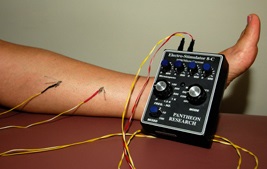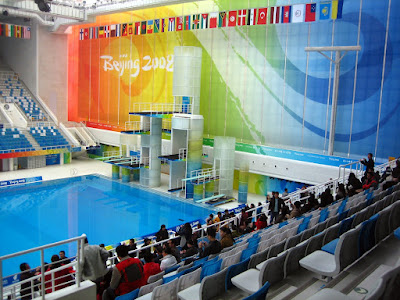Yesterday, Yasi's roommate gave Yasi and me free tickets to go see a mystery performance at the Beida Concert hall. It turned out to be the Beijing Symphony, but because we didn't get a program during the first half, we were presented with a series of surprises of various qualities.

The orchestra itself was okay. Almost respectable, really. For the most part, the intonation was decent, and although the dynamics could have used more finesse, they were present. I think it was the hall's fault, partly; it didn't spread the sound as well as it could, so the orchestra just sounded dry and tinny - or at least as dry and tinny as a full symphony with a harp in attendance can sound.
Their first piece was what sounded like Sousa arranged for orchestra. Yasi, who doesn't know classical music, laughed quite a few times during it and dubiously pronounced it "cute". She's too kind. (I think it was Sousa; I couldn't read the Chinese on the board.)
Next was the "modern" piece, titled "Ah!" and reflecting Chinese opera. Which... was fun for the first 2-3 minutes, as modern pieces generally are. It had more creative orchestration than most of its kind, though, including mouthpiece-popping and string-slapping, as well as hisses and cries from the musicians.
After this, Yasi was ready to quit. I don't blame her; the combination of bad-Sousa-for-orchestra and a modern piece had worn me down, too. Why do conductors made bad music choices? Sousa will not be forgotten while marching band parades and military wind ensembles exist. Why bring him into the symphony hall?!
But! They tried to win us back by playing Tchaikovsky's Romeo and Juliet Suite. It could have been magical; it almost was. The strings really were exemplary. But... but! It was the flutes that broke my heart. During the love theme, the famous famous love theme, where it's flutes and oboes for about 32 bars? They were horribly out of tune with each other. And not just a little; a good 10 cents off, reminding me painfully of my own butchering of Dvorak and Mendlessohn. They're professionals, though - not Whitman Orchestra wannabes. That broke my heart a little. They didn't even try to fix it - just chugged on, phrase after painful phrase.
During intermission, after caving and spending 2 kuai on a program, I figured that the tu pian in the title of the next song could refer to actual pictures, and the su and er in the composer's name might be bits of "Mussorgsky"; so I was suitably excited when I overheard an elderly white man in a tuxedo patiently explaining, to the politely confused program salespeople, that Mussorgsky had a painter friend, who died, and this piece is all about paintings, see, lots of different paintings, - but he was starting to get frustrated, and I was happy to flee before he was politely and efficiently led back to his seat.
"Pictures at an Exhibition" was wonderful. Yes, the off-beats had serious timing issues; yes, the tuning was peccable; but the tuba and first trumpet really stole the show. That tuba player was bomb. As was the 6'5'' German trumpet player (we came upon him smoking outside his bus right after the concert, so I had the chance to fangirl a little and inquire as to their further concerts).
After the concert, they had three (3!) encores, which... was a bit rich. The first was a schmaltzy arrangement of a Chinese folk tune, the sort that they play on loop over the bus and train loudspeakers, but the audience was enraptured. The trumpet guy (who was the focus of our attentions, as his head and shoulders stuck out far above the rest of the orchestra) was not amused as he played his 8 alloted bars of the gentle, string and flute heavy, ornamented tune. But he perked up for their second encore - the Can Can. (As cheesy as it is, it would be hella fun to play.) And by the time they played their last encore, a mercifully short string arrangement of an erhu tune, the audience was tired of clapping and pretending to want more.
All in all, it was a nice echo of the world I left to come to China. And it was completely worth it, because it was free! :D
















































